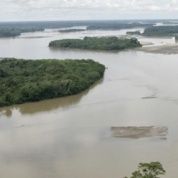Human Rights Watch seems to have it out for the government of Ecuador’s Rafael Correa.

On August 27, Americas Managing Director Daniel Wilkinson penned an article about the alleged persecution of environmentalists in Ecuador, marking yet another biased and misleading article from the controversial NGO.
The article, entitled Environmentalists Under Siege in Ecuador, largely recycles old and thoroughly debunked criticisms of the Correa government.
Wilkinson first attempts to establish credibility by invoking Pope Francis and his commendable efforts to address the climate change crisis. Unfortunately for Wilkinson, while the pontiff did comment on environmental stewardship during his visit to Ecuador, he later took exception to the politicization of his comments during his visit. When asked by a reporter to clarify his comments, Pope Francis said, “I refer to the greater consciousness the people of Ecuador has been gaining, its courage. It cannot be attributed to one concrete political situation.”
Pope Francis actually had nothing but praise for Ecuador during his visit and sent a hand-written letter in August to the country to thank them for their hospitality.
The author recognizes the innovative attempt by the Correa government to refrain from exploring its oil reserves in the Yasuni National Park by getting pledges from the international community to leave the oil in the ground. However, the international community did little to support the project, and the money raised fell far short of the goal. Wilkinson nonetheless goes on the offensive, attacking the government for opening up 1 percent of Yasuni for oil exploration.
As usual, rich developed countries are let off the hook for failing to living up to their role in combating climate change, while developing nations are chastized for attempting to build their economies.
Under Correa, Ecuador has invested oil revenue into important public infrastructure investments, such as hospitals, schools, and highways, with much going directly back into communities in the Amazon. Leaving the oil in the ground would mean depriving the government of millions of funds that it says are needed to continue reducing poverty.
Wilkinson poses the challenge of how to “balance economic development against protecting the global environment” but provides no answers as how to fund badly needed infrastrucre and social programs without oil revenues. It is an attitude – common among some environmentalists from richer nations – that implies that the people of the global south should once again shoulder the burden of the climate change crisis.
Based solely on speculation, Wilkinson then attacks the government over Executive Decree 16. He claims it was implemented ahead of the decision to open oil exploration in the Yasuni in order to strengthen the government's ability to persecute environmental activists.
Executive decree 16, which mandates NGOs be transparent about their funding and activities, is in fact based on a 2009 law and was not implemented to crush dissent as the author implies.
The decree specifies that NGO’s be required to reveal their sources of funding and that they keep to their organizational mandate. NGOs in Latin America have a dubious reputation, with cables published by Wikileaks proving what many long suspected – that the United States funds NGOs as a means of deliberately interfering in the internal affairs of sovereign countries, in some cases supporting organizations aimed at regime change.
Decree 16 was indeed invoked to cease the operations of the Pachamama Foundation, whose members were involved in incidents of violence including an attack on then Chilean Ambassador to Ecuador, Juan Pablo Lira. Wilkinson tries to down-play these violent actions and suggests the group was not afforded due process, when in fact its suspension was done in strict accordance with Ecuadorean law.
The author then questions the integrity of the National Electoral Council, known as the CNE, which was responsible for reviewing the collection of signatures aimed at calling a referendum on oil exploration in the Yasuni. The pages of signatures were rife with inconsistencies and errors, names of celebrities and fictional characters appeared on the list, many names appeared more than once.
The Yasunidos group which organized the petition, were in fact given the opportunity to audit the revision of signatures, but refused to participate and instead attacked the vehicle carrying the collection of signatures in an effort to prevent their transport.
Wilkinson does not mention these facts.
Finally, echoing statements from Ecuador’s opposition groups, Wilkinson characterizes the Correa government as repressive and authoritarian, suggesting that activists who have organized violent protests were the victims of persecution. He speculates that these people are now engaged in self-censorship, yet provides no documentation to justify such an assertion.
Instead he cites criticism levied against the activist Esperanza Martinez, who had falsely claimed that the road into Yasuni measured 60 meters wide. A commision from the Ecuadorean National Assembly, which included opposition politicians, found in January that the right-of-way inside Yasuni is only 10 meters wide.
Wilkinson also characterizes recent violent opposition protests that left dozens injured, as “peaceful.” As teleSUR has previously documented, police in fact showed extraordinary restraint in the face of violent protestors who sought to break police lines in order to storm a pro-government rally taking place in front of the presidential palace.
Far from being authoritarian and closed to dialogue, the Correa government is currently engaged in a widespread consultative process aimed at addressing the problem of inequality in the country. The opposition has declined to participate, instead calling for Correa to be ousted.
Ultimately the timing of Wilkinson's article should be cause for concern, private media outlets and NGOs such as Human Rights Watch have all recently come out with biased, distorted attacks on the Correa government. Coincidentally, these come on the heels of a recent rash of opposition protests which have also looked undermine and destabilize a democratically elected government that still enjoys widespread support.